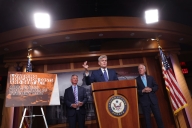You have /5 articles left.
Sign up for a free account or log in.
The U.S. Department of Education is expanding the Second-Chance Pell Experimental Sites Initiative.
The initiative lets colleges provide need-based Pell Grants to people who are incarcerated in state or federal prisons. The expansions will nearly double the number of colleges and states that can participate, adding 67 colleges to provide these grants, according to a news release.
Currently, 63 colleges in 26 states participate in Second-Chance Pell. This expansion brings those numbers to 130 institutions in 42 states and Washington, D.C.
The institutions that are invited to participate in the expansion include Georgia State University, Miami Dade College and Ozarks Technical Community College.
The Vera Institute of Justice provides technical assistance to participating colleges and corrections departments.
“The expansion of Second-Chance Pell is a testament to the fact that broader access to college in prison is a strategy that works -- to improve safety, strengthen communities and expand opportunity in our country,” Nick Turner, president and director of the institute, said in a release. “We are thrilled the Department of Education has taken this important step, and Vera remains committed to working with Congress and partners across the spectrum to permanently remove the ban on Pell Grants for people in prison once and for all.”
Research has shown that incarcerated people who participate in education programs are less likely to return to prison once released and are more likely to find jobs. Prison education can also improve the safety of prisons.
“I’ve had the pleasure of visiting several Second-Chance Pell institutions and have seen firsthand the transformative impact this experiment has on the lives of individuals who are incarcerated,” U.S. Secretary of Education Betsy DeVos said in the release. “By expanding this experiment, we are providing a meaningful opportunity for more students to set themselves up for future success in the workforce. The stories I’ve heard from students and institutions engaged in the experiment are very encouraging, and we look forward to seeing how this expansion will help even more students achieve a better future.”




